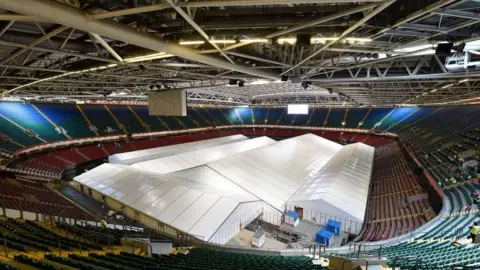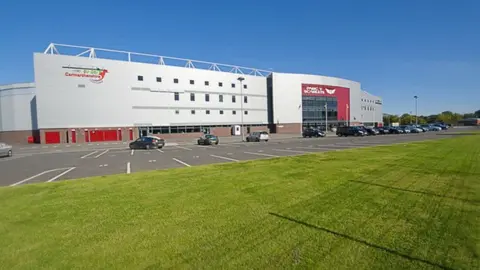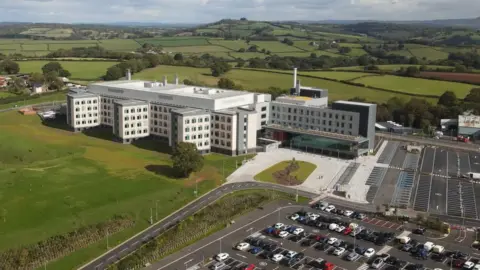Covid-19: Are field hospitals operating in Wales?
 Getty Images
Getty ImagesWhen the coronavirus pandemic struck in the spring, facilities all over the country from sports stadia to theatres were rapidly converted into field hospitals.
Known in Wales as Enfys (Rainbow) hospitals and in England as Nightingale hospitals, they provided thousands of extra beds, many of which were never needed.
With cases now rocketing and regular hospitals closing other services because of the high number of Covid cases filling beds, are field hospitals still part of the mix for patient care?
How many field hospitals opened in Wales?
A total of 19 field hospitals were opened in Wales in the spring at a cost of £166m. The most prominent of these was the Dragon's Heart Hospital at the Principality Stadium in Cardiff, which had 2,000 beds and was the only facility of its kind to actually admit patients during the first lockdown.
It was decommissioned in the autumn.
In September, Health Minister Vaughan Gething announced nine of the hospitals would close.
Which field hospitals remain?
 Geograph/Nick Earl
Geograph/Nick EarlThe remaining 10 provided about 2,600 additional beds. They are situated at:
- Venue Cymru in Llandudno
- Ysbyty Enfys Deeside
- Brailsford Centre at Bangor University
- Ysbyty'r Seren, Bridgend Industrial Estate
- Y Barn at Parc y Scarlets, Llanelli
- Selwyn Samuel Centre in Llanelli
- Bluestone holiday village in Pembrokeshire
- Aberystwyth leisure centre
- Cardigan leisure centre
- Bay Studios in Swansea.
In addition, a new £33m facility, known as the Lakeside Wing, is being built at the University Hospital of Wales which will have a dedicated 400 beds for coronavirus patients.
Mr Gething said at the time another 2,500 coronavirus beds would be provided through the Cardiff site, the opening of the Grange University Hospital near Cwmbran, and at existing hospitals.
Although an excess of Covid patients did not materialise during the first wave, meaning Rainbow hospitals were not used, some were put to other uses in the meantime while they were held in readiness for a second surge in cases.
Venue Cymru, for example, was being used for maternity outpatients appointments, antibody testing and an administration centre for Betsi Cadwaladr health board.
Are the field hospitals being used?
Some are. Of the health boards asked, Cwm Taf Morgannwg confirmed Ysbyty'r Seren in Bridgend Industrial Estate had 57 out of its 163 beds occupied.
In the Betsi Cadwaladr area, Ysbyty Enfys Deeside has 22 Covid patients being cared for and the health board said it had plans to accommodate more patients as demand increased.
Cardiff and Vale said it was using its existing capacity but had 166 beds ready to utilise in the new Lakeside Wing and would have the remaining 234 beds ready if necessary by 28 January, and was recruiting staff for the facility.
Aneurin Bevan, which does not have a field hospital, currently has 404 Covid patients at its hospitals. A spokesman said that compared with 283 at the height of the spring wave, but added its critical care beds were not full.
Hywel Dda has more than 150 Covid patients in its existing acute care hospitals and warned staffing was a problem, with about 930 off sick or isolating.
Helen Whyley, head of the Royal College of Nursing in Wales, said opening field hospitals up to patients was an option with the "significant rise in infection rates" seen over the past few weeks.
She told BBC Wales: "We know that we can open field hospitals; we did that in the first wave."
However she added an important caveat, saying: "Field hospitals are beds and equipment that have been invested in. The real tricky bit is making sure that they're staffed by expert, clinical staff.
"So that's the ICU doctors, intensive care nurses, infection prevention and control nurse, support workers, all those people are much more important than whether we've got enough beds etc.
"We have some issues in terms of the staffing - staff have got the virus, staff are self-isolating, so we don't want to spread our very precious resource too thinly and make sure that we've got the right staff in the right place to give really good quality care to people that need it."
What is the situation with capacity in regular hospitals?
On Monday, Welsh Intensive Care Society chairman Dr Richard Pugh said 190 critical care beds were being used, half of those by coronavirus patients, meaning critical care was already over capacity.
Two health boards in south Wales have already cancelled some non-urgent care - Swansea Bay and Aneurin Bevan University Health Boards.
 Aneurin Bevan University Health Board
Aneurin Bevan University Health BoardAlthough Grange Hospital in the Aneurin Bevan area was touted as providing extra help with capacity during the coronavirus period by the health minister, a 73-year-old man had to wait for 19 hours in an ambulance before he was admitted there on Saturday.
Ambulances spent the equivalent of a week's worth of waiting outside the Grange on the same day.
UK ministers have written to First Minister Mark Drakeford offering "mutual aid" in the form of treatment for Welsh patients in English hospitals if those in Wales become unable to treat non-Covid patients.
However Welsh deputy economy minister Lee Waters accused the UK government of "cheap posturing", pointing out that Wales had similarly provided repeated mutual aid to other parts of the UK previously in the pandemic.
